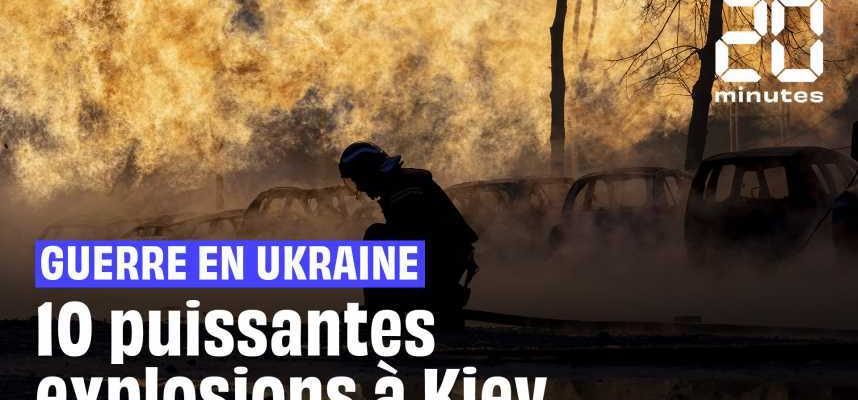In Ukraine, there were fewer snowflakes than bombs for the end-of-year celebrations. From December 29 to January 2, Russia launched nearly 300 missiles and 200 Shahed explosive drones on the country, according to Ukrainian President Volodymyr Zelensky. On Tuesday, Moscow’s “massive” strikes, mainly centered on Kharkiv and kyiv, killed at least five civilians and injured 119 people. Patriot air defense systems intercepted 72 Russian missiles, a “record” according to the Ukrainian army. This avalanche of fire and blood is falling on Ukraine while another fight (a win in advance) is looming in Russia: the first round of the Russian presidential election is due to take place from March 15 to 17.
The Russian “theater” presidential election
“This election is just a play, it will have nothing to do with a vote in a country that is even remotely democratic,” immediately moderates Cécile Vaissié, university professor of Russian and Soviet studies at Rennes-II. . While it is still forbidden to talk about it and refer to it as such in Russia, the war in Ukraine occupies only a tiny place in public debate. “The campaign is not interested in the conflict. During his press conference on December 14, Vladimir Putin devoted very little time to the war in Ukraine. And during his vows, he mentioned it in a single sentence, paying tribute to the “heroes who fight” and reaffirming that he would not back down,” recalls Jean de Gliniasty, research director at the Institute of International Relations. and strategic (Iris).
“In any case, there is no anti-war candidate. Only Alexeï Navalny could have provided a divergent voice but he was sent beyond the polar circle [dans une colonie pénitentiaire en Arctique] », Underlines the former ambassador to Russia. With or without a military victory, and while all dissident candidates have been previously ruled out, Vladimir Putin is therefore guaranteed to run for a fifth term. However, “he would love to be able to say on the eve of the elections: ‘that’s it, Ukraine is now part of the Russian Federation.’ Not in the hope of convincing voters but simply to be satisfied with his victory,” notes the university professor. Especially since he has a “macho and imperialist” mentality and he was “humiliated in Ukraine”, she recalls.
The desire for revenge
While he promised to take kyiv in three days, Moscow’s territorial gains are indeed very meager. And this new bombing regime, a “completely conscious terror” according to Volodymyr Zelensky, comes just after the deadliest attack on Russian territory since the start of the invasion in Ukraine. On Saturday, the city of Belgorod was bombed and 25 people lost their lives. Faced with this new humiliation, the Russian president immediately promised to “intensify” his bombings on Ukraine, which were already extremely deadly. “The attack on Belgorod probably constituted a shock for Russia, it is a change of scale. Russian territory had already suffered attacks but, until now, they were marginal,” recalls Jean de Gliniasty. “It is certain that Vladimir Putin did not appreciate seeing his territory hit like this,” adds Cécile Vaissié. He clearly had a stroke and this is one of the reasons which explains the intensification of the strikes in recent days. »
The Russian president is indeed working hard to “show his population that this war is not one, that no one is suffering from it and that it is only “business as usual””, recalls Jean de Gliniasty who slips: “It’s difficult to maintain this image of normality when a big city is massively bombed. » The fact remains that the attack on Belgorod is repeated in the Russian media to justify “Moscow’s narrative, according to which Russia is an attacked country”, notes Cécile Vaissié who recalls that on the contrary, the accidental strike by the army of the Russian air on one of its own villages, Voronezh, was stifled by the Kremlin. The desire for revenge therefore probably “must have accelerated the timetable of Russian strikes”, notes Jean de Gliniasty.
“Crush the morale of the population”
However, reprisals are not the only motivation for Moscow which, like last winter, is working to shell Ukraine. “Their winter attack plan is to bomb Ukrainian infrastructure to block water and electricity supplies, hoping to create fatigue and a movement toward capitulation among the population,” deciphers the former ambassador to Russia, assuring however that “it is illusory”. If last year’s massive outages had plunged the Ukrainian population into cold and darkness, on Tuesday power was restored in just a few hours in kyiv.
Energy infrastructure seems to have been relatively spared, thanks to better anti-aircraft protection or a slight change in Kremlin strategy. Moscow, however, tried to “break the morale of the Ukrainian population” by striking at the time of the holidays, while “the Christmas period extends from December 24 to January 14, the Orthodox New Year in the country”, notes Cécile Vaissié . The weather, military and political calendar had a devastating snowball effect for Ukraine. The population has, fortunately, mostly passed between the snowflakes. Logical, however, since Russia, by showering the country with strikes, is “not in the search for efficiency but in a demonstration of power and nuisance”.

